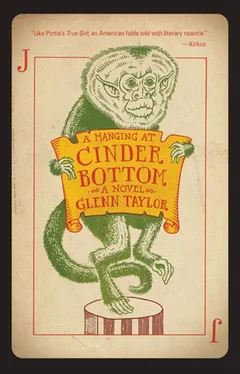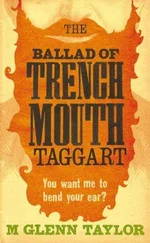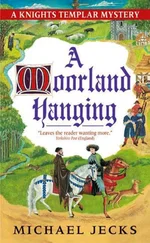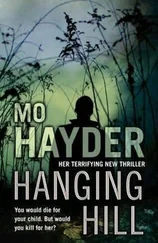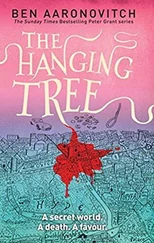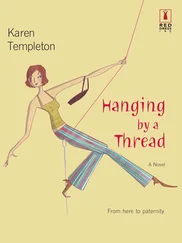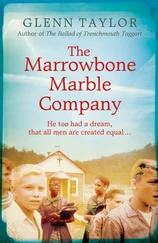Agnes stepped back, her mouth open.
Ben kicked at one with his bare foot.
“Are they dead?” Aggie asked.
“Asleep,” Abe said. “And if you wait a little while, you can watch em wake up.”
They waited. Abe had to pick Ben up to keep him from kicking at one poor crow.
From his perch, the boy grunted at the birds.
Agnes frowned and looked as if she might again begin to sob.
A minute passed, then another, and when one began to stir, Agnes sounded a gleeful note. Two flapped a wing and she clapped and hopped in place.
Then the crows rose from the smashed goosegrass, awaking from their hypnosis on wobbly legs.
“Climb!” Abe commanded, and they did.
Goldie smiled at the sound of their wings on the air, the birds otherwise silent as they flew up past the heads of the children.
Back inside, Goldie lowered the lampwick and got next to Agnes in her bed. She let the girl read to her. Abe watched them before he went to the kitchen, where his mother stood staring out the same window. He rubbed her shoulders.
The boarder descended the staircase. He thought for a moment of leaving without acknowledging the pair, but he changed his path and stepped in their direction.
He was a frail man whose spectacle lenses were thick as lampshade glass. Beneath them, his eyes were small and quick to twitch. They were the kind of pale blue that was not to be trusted. His mustache was thin as gut string, his posture weak. Abe did not like the man from the moment he stepped into the kitchen.
“I am quite a bit more than sorry for your painful loss,” the boarder said to them. The sharp enunciations of his t ’s and s ’s were not pleasing to the ear of regular folk. “Young Mr. Baach had turned to the Lord and will find his place in the kingdom.” He smiled. “I must journey now for my nightly walk.” He donned his block crown hat and stepped to the door.
When he was gone, Abe said, “That was a lady’s hat he put on his head.”
“It wasn’t.” Sallie turned to the heap of unwashed dishes.
“Put a peacock feather in it why doesn’t he?” Abe said. He picked up a stack of plates and dunked them. “What’s his name?”
“Ladd,” she said. “Oswald Ladd.”
“Where’s he from?”
“Virginia.”
“I don’t trust his eyes.”
“Hush Abraham.”
Goldie came down the stairs and stood in the kitchen doorway. “Agnes enjoys some very strange literature,” she said. She stretched her stiffened back. “A man had his nose cut off and buried and sewed back on upside down.”
“Did you spy my biscuit roller up there?”
“The man had to stand on his head to blow his nose.” Goldie watched the muscles in Abe’s neck, the way the lamplight lit his ears transparent.
“Does that boarder’s room have an outside lock?” Abe asked his mother.
“I said hush.”
“Abe, let’s you and me go for a walk,” Goldie said.
In the dark aisle of the crib barn Jake had built with her father, Goldie brushed the neck of the mare who’d pulled the wagon to the cemetery and back. She was the only horse on the property then, a chestnut with two white socks and a snip at her nose. Hers was the only stall housing life — five of six cribs kept little more than sawdust and chicken feed. Spun webs thick as cheesecloth linked rafter boards. A square of moon through the loft window lighted the place. Goldie said to Abe, “This mare is Snippy. You knew her mother.”
“Dot?”
“That horse could outstrip a downgrade mail train.” She could still remember the old urge to throw a leg over.
“What happened to her?”
“Back broke coming down the creek bank.” She put her hand to the mare’s white spot. “Jake put her down with his Winchester right there in the water.” Drool ran from the horse’s jutted lip. “This one here isn’t half what Dot was.”
He neither spoke nor moved to touch her.
Goldie looked in the eye of the horse. She said, “You broke off the end of Nina Gyro’s tailbone.”
He took a deep breath. There was a whistle in his left nosehole.
“She stayed here in town for a while,” Goldie said. “Mostly at the opium den.”
He watched her shoulders, her neck. All that brown and gold hair knotted high by an ebonite comb.
“After she fell, it hurt that little woman to so much as sneeze, and that magician husband up and left her. What kind of man leaves his broken-tailboned wife?”
“Not much of one.”
“You know I met a man told me the Great Gus George got committed two years back for running the streets of New York raving naked?” She laughed. “Man said it was nine degrees outside. Said old Gus had a mitten on his tallywags.” She shook her head. “At any rate, once Nina could walk, she limped into Fat Ruth’s asking about work.” She shooed a slow fly from Snippy’s muzzle and the horse nodded deep. “I was liable to have killed her had she not told me the truth about that night she spent in your bed.”
He could think of nothing to say in return.
“Well,” Goldie said. “She died of her own accord the next winter.”
There was a gust through the aisle. Colder air was coming.
Abe said, “I looked for you that day. I aimed to tell you nothing happened.”
The horse had gone still at Goldie’s touch. She said, “I imagine you’ve had your share of women now.”
He thought on how to answer. “I’ve got my rules.”
She turned and faced him. “What are they?”
“She’s got to smell good, one.”
Goldie lifted her arm over her head and sniffed. “Like a pink pasture rose,” she said.
He smiled. “Two, she’s got to have a little money in the bread box.”
She stuck her finger and thumb between her breasts. “Well, I’ve always got a little in mine,” she said, and she produced a tight roll of notes shoestrung in green ribbon.
He laughed. “Is that what you’re calling that spot these days?” And he looked at that spot as he had so many times before.
“Any more rules?”
“No whores,” he said.
She put back the skinny bankroll. “That ought to have been the first one you said.” And she thought about his rules and what trouble he may have found in all those years gone, and she thought too on her own rules and trouble. “Since you are so unaccustomed to the ways of a proper brothel,” she told him, “I’ll explain something to you. A madam might be what she is, but I’ll tell you what she isn’t. She is no man’s five-dollar chippy.”
And they said nothing for a time but only breathed and stared, and then they were together and moving to the open stall at barn’s end where they fell upon a waist-high hill of sawdust, and they were quiet, and they shed only what needed shedding, and their eyes were wide open all the while.
Afterward she lay with her head on his chest as before, and they began to speak of a new kind of plan, one wholly unconcerned with marriage or their role in the reproduction of the species or Delmonico sleeper cars or seeing the world. It was a plan that aimed to do right by Jake. By all the Baaches and Big Bill Toothman too. It would come to be, in fact, not a plan at all. It would come to be the big con.
Abe had once worked long hours for Henry Trent, but the way he saw it now, even back then he’d merely been putting up the mark, merely been working toward the very moment inside of which he now lived.
Goldie looked up at him. “You’re an awful quiet kind of man these days,” she said.
He smiled and kissed at the line of scalp he’d made stroking her hair. He said to her, “I need to know everything about everyone.”
The air in the barn grew chilly, so they brushed themselves off and moved to a vacant room in the second house, where it was Goldie’s turn to talk. They ate cold biscuits smeared in honey. For three hours, she would tell him who was who in town since he’d left. Some of the flush were the same as they’d been and some were new.
Читать дальше
Конец ознакомительного отрывка
Купить книгу
